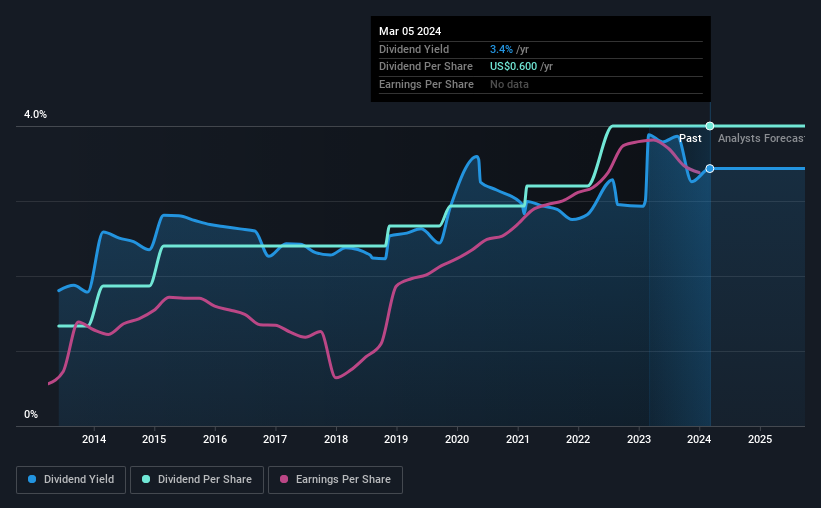ESSA Bancorp (NASDAQ:ESSA) Has Announced A Dividend Of $0.15
ESSA Bancorp, Inc. (NASDAQ:ESSA) has announced that it will pay a dividend of $0.15 per share on the 29th of March. This payment means that the dividend yield will be 3.4%, which is around the industry average.
View our latest analysis for ESSA Bancorp
ESSA Bancorp's Payment Expected To Have Solid Earnings Coverage
Unless the payments are sustainable, the dividend yield doesn't mean too much.
ESSA Bancorp has a long history of paying out dividends, with its current track record at a minimum of 10 years. Based on ESSA Bancorp's last earnings report, the payout ratio is at a decent 32%, meaning that the company is able to pay out its dividend with a bit of room to spare.
The next year is set to see EPS grow by 6.3%. If the dividend continues on this path, the future payout ratio could be 32% by next year, which we think can be pretty sustainable going forward.
ESSA Bancorp Has A Solid Track Record
The company has a sustained record of paying dividends with very little fluctuation. The dividend has gone from an annual total of $0.20 in 2014 to the most recent total annual payment of $0.60. This works out to be a compound annual growth rate (CAGR) of approximately 12% a year over that time. Rapidly growing dividends for a long time is a very valuable feature for an income stock.
The Dividend Looks Likely To Grow
The company's investors will be pleased to have been receiving dividend income for some time. ESSA Bancorp has impressed us by growing EPS at 13% per year over the past five years. ESSA Bancorp definitely has the potential to grow its dividend in the future with earnings on an uptrend and a low payout ratio.
We Really Like ESSA Bancorp's Dividend
Overall, we think that this is a great income investment, and we think that maintaining the dividend this year may have been a conservative choice. The company is easily earning enough to cover its dividend payments and it is great to see that these earnings are being translated into cash flow. Taking this all into consideration, this looks like it could be a good dividend opportunity.
Companies possessing a stable dividend policy will likely enjoy greater investor interest than those suffering from a more inconsistent approach. Still, investors need to consider a host of other factors, apart from dividend payments, when analysing a company. See if management have their own wealth at stake, by checking insider shareholdings in ESSA Bancorp stock. Looking for more high-yielding dividend ideas? Try our collection of strong dividend payers.
Have feedback on this article? Concerned about the content? Get in touch with us directly. Alternatively, email editorial-team (at) simplywallst.com.
This article by Simply Wall St is general in nature. We provide commentary based on historical data and analyst forecasts only using an unbiased methodology and our articles are not intended to be financial advice. It does not constitute a recommendation to buy or sell any stock, and does not take account of your objectives, or your financial situation. We aim to bring you long-term focused analysis driven by fundamental data. Note that our analysis may not factor in the latest price-sensitive company announcements or qualitative material. Simply Wall St has no position in any stocks mentioned.

 Yahoo Finance
Yahoo Finance 
